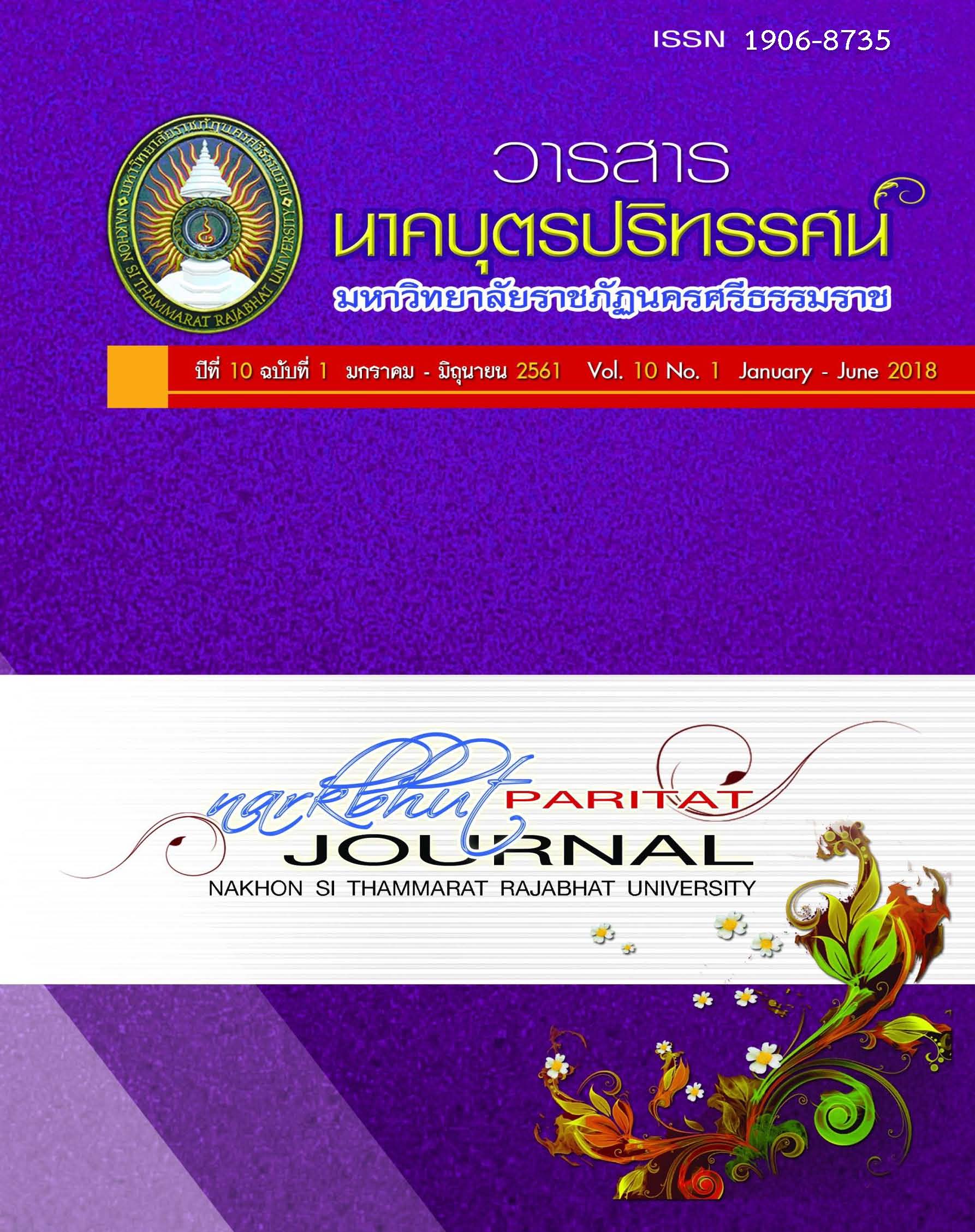การประเมินโครงการห้องเรียนพิเศษ (English Program) ของโรงเรียนสิริรัตนาธร โดยประยุกต์ใช้รูปแบบการประเมินโครงการแบบ CSE ของอัลคิน Evaluation of the English Program at Sirirattanathorn School Applying the Alkin Evaluation Approach as Developed at UCLA’s C
Main Article Content
บทคัดย่อ
บทคัดย่อ
การวิจัยครั้งนี้มีวัตถุประสงค์เพื่อประเมินผลโครงการห้องเรียนพิเศษ (English Program) ของโรงเรียน
สิริรัตนาธรโดยประยุกต์ใช้รูปแบบการประเมินโครงการแบบ CSE ของ อัลคิน (Alkin) โดยมีวัตถุประสงค์เฉพาะดังนี้ (1) เพื่อประเมินระบบโครงการ (system assessment) (2) เพื่อประเมินการวางแผนโครงการ (program planning) (3) เพื่อประเมินการดำเนินโครงการ (program implementation) (4) เพื่อประเมินการปรับปรุงโครงการ (program improvement) และ (5) เพื่อประเมินการยอมรับโครงการ (program certification)
ผู้ให้ข้อมูลที่ใช้ในการวิจัย มี 5 กลุ่ม ได้แก่ (1) ผู้บริหาร จำนวน 5 คน (2) คณะกรรมการดำเนินงานโครงการ จำนวน 12 คน (3) ครูผู้สอนในโครงการ จำนวน 72 คน (4) ผู้ปกครองในโครงการ จำนวน 273 คน (5) นักเรียนในโครงการ จำนวน 273 คน รวมทั้งหมด 635 คน เครื่องมือที่ใช้ในการวิจัยเป็นแบบสอบถาม จำนวน 5 ฉบับ
ซึ่งมีค่าความเชื่อมั่นเท่ากับ 0.95, 0.95, 0.95, 0.95 และ 0.97 ตามลำดับ สถิติที่ใช้ในการวิเคราะห์ข้อมูล ได้แก่ ความถี่ ร้อยละ ค่าเฉลี่ย ส่วนเบี่ยงเบนมาตรฐาน การทดสอบค่าที (t-test) และวิเคราะห์เนื้อหา ผลการวิจัยพบว่า
- ผลการประเมินระบบโครงการ จากผู้บริหารและคณะกรรมการดำเนินโครงการ พบว่า ด้านกาประเมินเกี่ยวกับสภาพทั่วไปของโครงการ มีความเหมาะสมในระดับมาก ส่วนด้านการประเมินตามวัตถุประสงค์ของโครงการ มีความเหมาะสมในระดับมากที่สุด ซึ่งผลการประเมินระบบโครงการในภาพรวมมีความเหมาะสมในระดับมากที่สุด สรุปว่าการประเมินระบบโครงการผ่านเกณฑ์การประเมิน
- ผลการประเมินการวางแผนโครงการ จากผู้บริหารและคณะกรรมการดำเนินโครงการ พบว่า ด้านหลักสูตรและเนื้อหาวิชา ด้านบุคลากร และด้านคุณสมบัติของนักเรียนในโครงการ มีความเหมาะสมในระดับมาก ส่วนด้านอาคารสถานที่ และด้านสื่อ วัสดุ อุปกรณ์ มีความเหมาะสมในระดับปานกลาง ซึ่งผลการประเมินการวางแผนโครงการในภาพรวมมีความเหมาะสมในระดับมาก สรุปว่าการประเมินการวางแผนโครงการผ่านเกณฑ์การประเมิผลการประเมินการดำเนินโครงการ จากครูผู้สอนในโครงการ พบว่า ด้านการจัดกิจกรรมการเรียนรู้ ด้านกิจกรรมเพิ่มศักยภาพ และด้านการวัดและประเมินผล มีความเหมาะสมในระดับมาก ซึ่งผลการประเมินการดำเนินโครงการในภาพรวมมีความเหมาะสมในระดับมาก สรุปว่าการประเมินการดำเนินโครงการผ่านเกณฑ์การประเมิน
- ผลการประเมินเพื่อการปรับปรุงโครงการจากคณะกรรมการดำเนินโครงการ ครูผู้สอนในโครงการ และนักเรียนในโครงการ พบว่า ข้อบกพร่อง ปัญหา และอุปสรรค ของโครงการที่มีความถี่สูงที่สุด คือ ครูผู้สอนชาวต่างชาติจบไม่ตรงสาขาที่สอน ข้อเสนอแนะและแนวทางแก้ไขที่มีความถี่สูงที่สุด คือ ควรจัดหาครูชาวต่างชาติให้ตรงตามวิชาเอก จุดเด่นของโครงการที่มีความถี่สูงที่สุด คือ นักเรียนในโครงการมีพัฒนาการในการใช้ภาษาอย่างเห็นได้ชัด ส่วนจุดด้อยของโครงการมีความถี่สูงที่สุด คือ สื่อเทคโนโลยีไม่ทันสมัย
- ผลการประเมินเพื่อการยอมรับโครงการ พบว่า (1) ผลสัมฤทธิ์ทางการเรียนวิชาภาษาอังกฤษของนักเรียนห้องเรียนพิเศษ (English Program) ในระดับชั้นมัธยมศึกษาปีที่ 1 ถึง ระดับชั้นมัธยมศึกษาปีที่ 3 สูงกว่าผลสัมฤทธิ์ทางการเรียนวิชาภาษาอังกฤษของนักเรียนห้องเรียนปกติอย่างมีนัยสำคัญที่ระดับ .05 ทั้งสามระดับชั้น
- ผลการประเมินผู้เรียนตามสมรรถนะสำคัญของหลักสูตรอยู่ในระดับดี และ (3) ความพึงพอใจของผู้ปกครองและนักเรียนต่อโครงการอยู่ในระดับมาก สรุปว่าการประเมินเพื่อการยอมรับโครงการ ผ่านเกณฑ์การประเมิน
Article Details
เอกสารอ้างอิง
Amornratanasak, S. et al. (2012). Educational Research Methodology. Bangkok: Publisher
Promotion Center academic. (in Thai)
Jantaratana, W. (2013). An evaluation of an instruction and study project in the form of
special classrooms at educational institutions under the jurisdiction of secondary
education service area office 8. Thesis of the Requirement for the Degree Master of
Education,Department of Educational Administration Graduate School. Ramkhamhaeng University. (in Thai)
Ministry of Education. (2002). National Education Act B.E.2542 (1999) and Amendments
(Second National Education Act .B.E. 2553 (2010). Bangkok: Prikwarn Graphic.co.,ltd. (in
Thai)
The Ministry of Education Thailand. (2010). The Basic Education Core Curriculum B.E. 2551
(A.D. 2008). 2nd Edition. Bangkok: The Agricultural Cooperative Federation of Thailand.
Limited. (in Thai)
Raksatham, N. (2012). Evaluation of the implementation of bilingual curriculum of
kindergarten Nakhon Si Thammarat at Nakhon Si Thammarat.
Anubannakhonsrithammarath school. Thesis of the Requirement for the Degree Master
of Education, Department of Educational Administration Graduate School.
Nakhon Si Thammarat Rajabhat University. (in Thai)
Rangchai Wiboonsi, Y. (2003). Evaluation research (Social action programs) Social sciences –
Methodology. Bangkok: Chulalongkorn University Printing House. (in Thai)
Office of Educational Innovation Development. (2005). Guidelines for the implementation of
Buddhist schools. 2nd Edition . One Project Service Center One school in dream. (in
Thai)
Office of the Basic Education Commission. (2016). Guidelines for Mini English Program
basic educational school 2016. Bangkok: The Agricultural Cooperative Federation of
Thailand. Limited. (in Thai)
Office of the Education Council. (2017). (Draft) National Education Plan, 2017–2036. Bangkok.
(in Thai)
Office of the Permanent Secretary, Ministry of Education. (2012). The Education
Development Plan of the Ministry of Education, No. 11, 2012 -2016. Bangkok. (in Thai)
Office of the Permanent Secretary, Ministry of Education. (2016). The Education
Development Plan of the Ministry of Education, No. 11, 2017 -2021. Bangkok. (in Thai)


